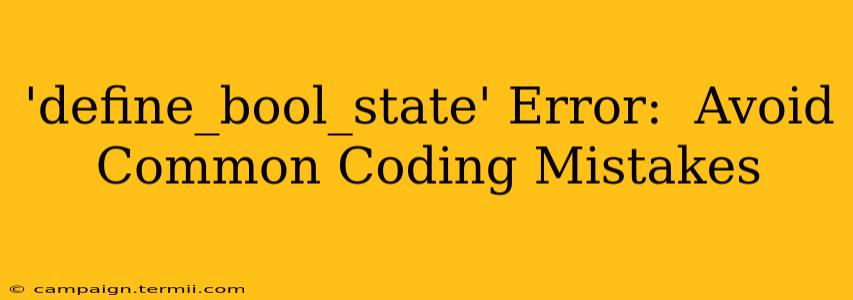The dreaded "define_bool_state" error, while not a standardized error message across all programming languages, generally points to problems in how boolean (true/false) states are defined and managed within your code. This often stems from subtle mistakes that can be surprisingly difficult to track down. This article will dissect common causes of these types of errors and provide practical solutions to help you avoid them. We'll cover various programming paradigms and offer advice applicable across different languages.
What Typically Causes 'define_bool_state' Errors? (Or Similar Boolean Logic Problems)
The core issue revolves around the inconsistent or incorrect representation of boolean values. This can manifest in several ways:
-
Incorrect Data Types: Attempting to use a non-boolean data type (like integers, strings, or floats) where a boolean is expected. For instance, using
0to representfalseand1fortruemight work sometimes, but can lead to unexpected behavior and errors if not handled consistently and carefully. Explicitly usingtrueandfalse(or their language equivalents) is always the safest and clearest approach. -
Type Coercion Issues: Many languages perform implicit type coercion, automatically converting data types in certain contexts. However, these conversions can be unpredictable with booleans. A function expecting a boolean might misinterpret an integer input, leading to a logical error. Explicit type casting is often helpful to mitigate this.
-
Logical Errors in Conditional Statements: Incorrect use of logical operators (
&&,||,!, etc.) can lead to conditions that never evaluate to true or always evaluate to true, regardless of the intended boolean state. Carefully reviewing the boolean logic withinif,else if,else,while, andforstatements is crucial. -
Uninitialized Variables: Using a boolean variable before assigning it a value results in undefined behavior. The variable might hold a garbage value that is incorrectly interpreted as true or false, creating unpredictable outcomes. Always initialize boolean variables.
-
Confusing Boolean Assignment: Mistaking the assignment operator (
=) for the equality operator (==) in boolean comparisons can lead to unintended consequences.x = trueassigns the valuetruetox, whilex == truechecks ifxis equal totrue.
Common Scenarios and Solutions
Let's delve into specific scenarios that frequently cause "define_bool_state" type errors (or similar issues depending on the specific error message from your compiler/interpreter):
1. Using Integers Instead of Booleans
Problem: Representing true as 1 and false as 0 without proper type checking.
Solution: Use boolean data types explicitly. Most programming languages have a built-in boolean type (bool, boolean, etc.). If type coercion is unavoidable, add explicit checks:
int value = 1;
boolean isValid = (value != 0); // Explicit check to convert integer to boolean
2. Incorrect Logical Operators
Problem: Misusing logical operators, leading to faulty conditional logic. For example:
if (x == 5 || y == 10 && z == 20) { // Ambiguous due to operator precedence
// ...
}
Solution: Use parentheses to clarify operator precedence and ensure the logical expression behaves as intended.
if ((x == 5 || y == 10) && z == 20) { // Clearer expression
// ...
}
3. Uninitialized Boolean Variables
Problem: Referencing a boolean variable before assigning it a value.
Solution: Always initialize boolean variables upon declaration.
my_bool = False # Explicit initialization
if some_condition:
my_bool = True
4. Assignment vs. Comparison
Problem: Accidentally using = instead of == in boolean comparisons.
Solution: Pay close attention to the difference between assignment and equality operators. Use a linter or static code analyzer to detect such mistakes early.
if (x == true) { // Correct comparison
// ...
}
x = true; // Assignment, not a comparison
Best Practices for Avoiding Boolean Errors
- Explicit Boolean Types: Always use the dedicated boolean type provided by your programming language.
- Clear Variable Names: Use descriptive names for boolean variables to enhance code readability.
- Consistent Logic: Maintain consistent logic in your boolean expressions.
- Code Reviews: Have another developer review your code to catch potential errors.
- Use a Debugger: Use a debugger to step through your code and examine the values of boolean variables at runtime.
- Testing: Write comprehensive unit tests to thoroughly verify the correctness of your boolean logic.
By following these guidelines and understanding the common pitfalls outlined above, you can significantly reduce the likelihood of encountering "define_bool_state" errors or similar problems related to boolean logic in your code. Remember that clear, well-structured code is the best defense against these frustrating bugs.

